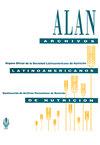Cardiometabolic risk profile in relation to the practice of healthy habits in a sample of Spanish workers
IF 0.3
4区 医学
Q4 NUTRITION & DIETETICS
引用次数: 0
Abstract
Insulin resistance is a pathological entity that can lead to alterations in lipid metabolism and can increase cardiovascular risk. Objective. The aim of this study was to assess the influence of different sociodemographic variables such as age, sex and social class and healthy habits such as smoking, physical activity and adherence to the Mediterranean diet on the cardiometabolic profile of Spanish workers. Material and methods. A descriptive, cross-sectional study was carried out in 1457 Spanish workers in an attempt to evaluate the effect of healthy habits (physical exercise determined with the IPAQ questionnaire, Mediterranean diet and tobacco consumption) and sociodemographic variables (age, sex and social class) on the values of different insulin resistance scales. Results. The progressive increase in the level of physical activity and high adherence to the Mediterranean diet achieved an improvement in the mean values and in the prevalence of elevated values in all the insulin resistance scales analyzed in this study. Age over 50 years and belonging to the least favored social classes (social classes II-III) were the variables that increased the risk of presenting insulin resistance. Male sex also increased the risk of presenting insulin resistance. Conclusions. The different healthy habits such as vigorous physical exercise and high adherence to the Mediterranean diet improve the values of the different scales that assess insulin resistance.西班牙工人样本中与健康习惯实践相关的心脏代谢风险概况
胰岛素抵抗是一种病理实体,可导致脂质代谢的改变,并可增加心血管风险。目标。这项研究的目的是评估不同的社会人口变量(如年龄、性别和社会阶层)和健康习惯(如吸烟、体育活动和坚持地中海饮食)对西班牙工人心脏代谢状况的影响。材料和方法。对1457名西班牙工人进行了一项描述性横断面研究,试图评估健康习惯(通过IPAQ问卷确定的体育锻炼、地中海饮食和烟草消费)和社会人口变量(年龄、性别和社会阶层)对不同胰岛素抵抗量表值的影响。结果。在本研究中分析的所有胰岛素抵抗量表中,体力活动水平的逐渐增加和对地中海饮食的高度坚持都改善了平均值和升高值的流行程度。年龄超过50岁和属于最不受欢迎的社会阶层(社会阶层II-III)是增加出现胰岛素抵抗风险的变量。男性也增加了出现胰岛素抵抗的风险。结论。不同的健康习惯,如剧烈的体育锻炼和对地中海饮食的高度坚持,提高了评估胰岛素抵抗的不同尺度的值。
本文章由计算机程序翻译,如有差异,请以英文原文为准。
求助全文
约1分钟内获得全文
求助全文
来源期刊
CiteScore
0.50
自引率
0.00%
发文量
31
期刊介绍:
Archivos Latinoamericanos de Nutrición (ALAN) is the official publication of the Sociedad Latinoamericana de Nutición (SLAN), for the dissemination of knowledge in the fields of food and nutrition, principally throughout the American Hemisphere. Articles in Spanish, English, Portuguese and French are accepted, both from the Society members and from nonmembers, in the following categories: 1. General articles (critical scientific reviews); 2. Research articles (originals); 3. Papers in applied nutrition (analytical results from intervention programs and discussion of reconmendations of practical application), and 4. Letters to Editor (short comments of general interest or about scientific facts and results previously published in Archives).

 求助内容:
求助内容: 应助结果提醒方式:
应助结果提醒方式:


